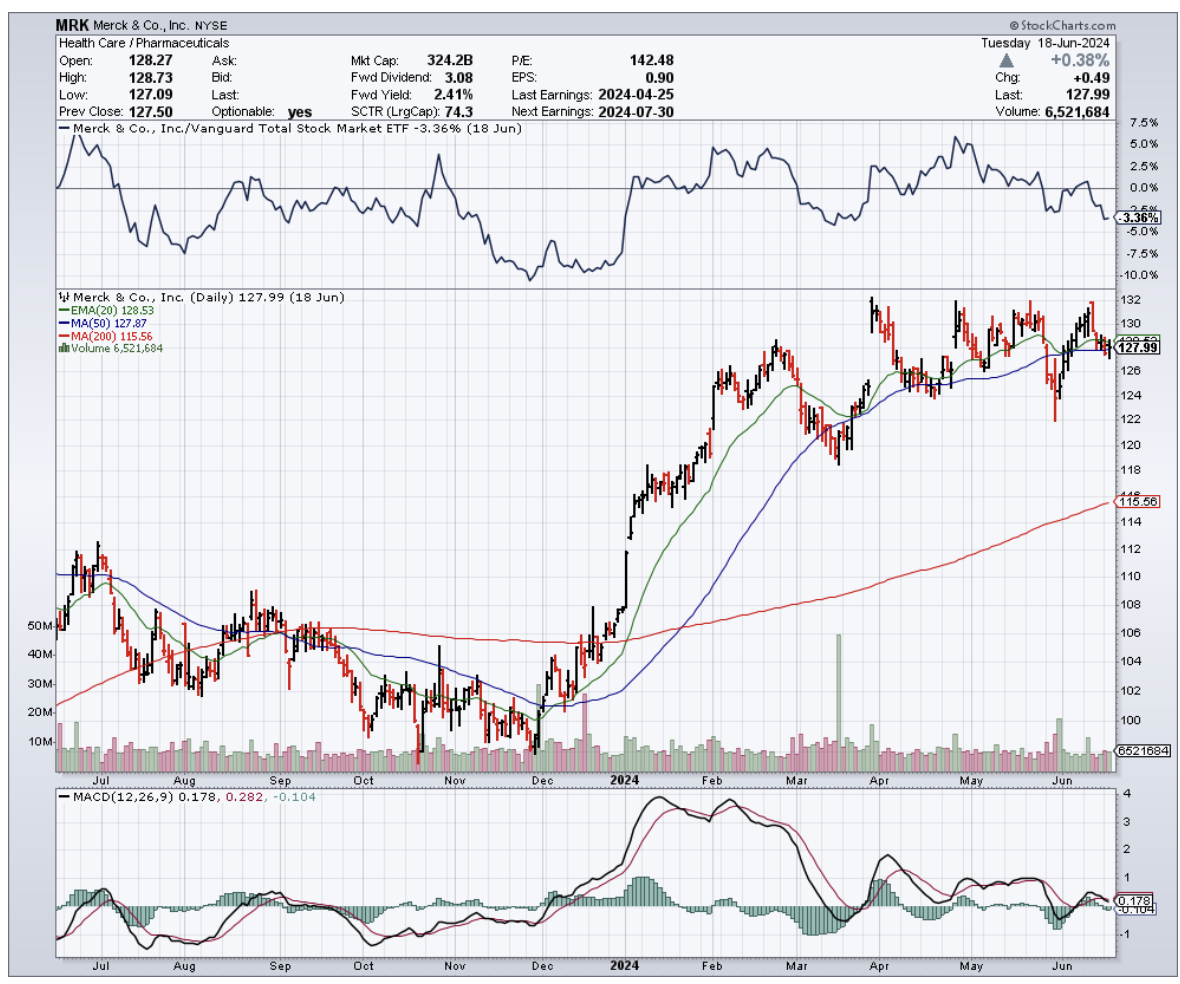More Than Meets The (Wall Street) Eye
Dawn breaks, and as usual, I'm buried nose-deep in my morning ritual. You will find me, fervently hopping from one news site to another, much like a kangaroo in the wild.
This means my mornings are a mixed bag of global news digest — from German dailies to French periodicals (thank goodness for translation tools, right?), all part of an old habit from my days as a reporter.
So, why am I blabbing about this?
Well, it's because of a recent headline that grabbed my attention: "This drug can "melt away" bowel cancer," screamed BILD, Germany's numero uno newspaper.
Now THAT made me sit up straight. And the medicine they were gushing about? Keytruda from our very own healthcare titan, Merck & Co. (MRK).
Don't get me wrong. Merck’s been on my radar long before this, but I didn’t really give it much thought until the last quarter of 2023. Why? Well, with an annual return shy of 7% since January 2004, it wasn’t exactly screaming “look at me.”
But as life would have it, the story changed around 4Q23. All of a sudden, I found myself in the Merck rabbit hole, and boy, the wonders I found there.
Merck has been making waves in major programs like oncology, helping not just my portfolio, but countless patients with serious health conditions.
Just this month, at the American Society of Clinical Oncology (ASCO) meet—think of it as the Oscars for oncology nerds—Merck really strutted its stuff. Since 2021, their oncology portfolio has ballooned from 40 to 53 approved indications, and approvals in early-stage cancers have jumped from 2 to 10. Impressive, right?
And here’s the most impressive update of all: Keytruda alone has snagged 9 new early-stage US approvals.
Then, there’s also the PD-1/PD-L1 heavyweight, which is the lone therapy proving an overall survival benefit across lung, renal, breast, and cervical cancers.
To fortify its case, Merck has over 30 Phase III trials with 30,000 patients targeting earlier treatment. Crucial studies demonstrating survival rates for early intervention - a win for patients and healthcare systems alike.
Now, I've skipped some nitty-gritty details about these drugs, mainly to avoid turning this into a science class. The focus here is the bigger picture: how well Merck is positioned for growth.
Merck's already helping 2.6 million people worldwide. But what's driving this? Their 53 approved indications across 23 tumor types and two tumor-agnostic indications. Not just in the U.S., but also in the EU and Japan. And guess what? They're just getting started.
The company’s oncology pipeline is predicted to generate a whopping $20 billion in sales by mid-2030. Current products not included.
On top of that, they are aiming for $63.1 billion in total revenue this year alone.
Oh, and if you thought Merck was just about cancer, think again. They’ve just thrown a gauntlet at Pfizer (PFE) with their new FDA-approved pneumococcal vaccine, Capvaxive.
For context, Pfizer has been leading the pneumococcal vaccines market like a seasoned quarterback with its Prevnar shots, raking in a cool $6.4 billion just last year.
Just last week, though, Merck got the green light from the FDA for Capvaxive, designed specifically with adults aged 18 and up in mind. It zeroes in on those nasty strains most responsible for causing pneumococcal disease in adults aged 50 and older. Between you and me, that makes it one-up on Pfizer’s Prevnar 20.
Now, I hear you asking, "John, is FDA approval the finish line?" Not by a long shot. This is just the intermission. Next up, we've got the CDC’s advisory committee recommendations, which could turn this game on its head.
At this point, most adults look to Pfizer for their shots. But, if the CDC switches their recommendation in favor of Capvaxive, they'll be the ones leading the charge in the pneumococcal vaccine market.
So, what does that mean for stockholders?
Excluding Capvaxive’s potential earnings, Merck has actually been on a roll, making more dough in the first quarter of this year than a baker's first shift.
In the first quarter alone, their vaccine portfolio, headed by GARDASIL, saw a 17% increase in sales. Even currency headwinds didn't stop Merck from outdoing itself.
After 13 consecutive annual hikes, Merck dishes out dividends like candy at a parade. You're looking at a yield of 2.4% - a sweet deal if I ever saw one.
And I have to say, Merck's been putting on quite a show, outperforming the Healthcare ETF over the last decade with 225% returns.
But here's the best part - the show isn't over. With expected EPS growth of 14% and 8% in 2025 and 2026 respectively, this stock is undoubtedly on a tear. With an A+ credit rating and a below 1x leverage ratio in 2024, Merck is proving to be a standout in the healthcare arena.
Now, I’m not one to tell you where to put your money, but if Merck keeps up this pace, their path of robust EPS growth and a powerhouse portfolio could make them a standout in your portfolio too.
So, maybe give that old stock a new look. Who knows? It could be just what the doctor ordered.

